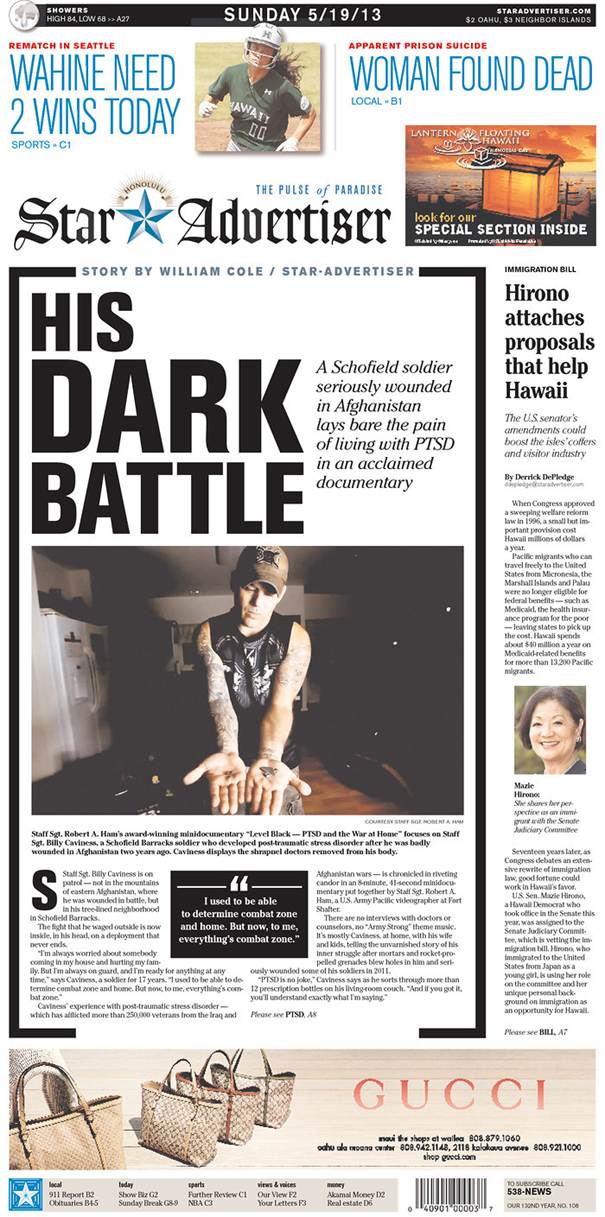Hirono Attaches Proposals That Help Hawaii
The US senator's amendments could boost the isles' coffers and visitor industry
When Congress approved a sweeping welfare reform law in 1996, a small but important provision cost Hawaii millions of dollars a year.
Pacific migrants who can travel freely to the United States from Micronesia, the Marshall Islands and Palau were no longer eligible for federal benefits — such as Medicaid, the health insurance program for the poor — leaving states to pick up the cost. Hawaii spends about $40 million a year on Medicaid-related benefits for more than 13,200 Pacific migrants.
Seventeen years later, as Congress debates an extensive rewrite of immigration law, good fortune could work in Hawaii's favor.
U.S. Sen. Mazie Hirono, a Hawaii Democrat who took office in the Senate this year, was assigned to the Senate Judiciary Committee, which is vetting the immigration bill. Hirono, who immigrated to the United States from Japan as a young girl, is using her role on the committee and her unique personal background on immigration as an opportunity for Hawaii.
Hirono has added amendments to the immigration bill that would restore federal Medicaid eligibility for Pacific migrants, make Hong Kong eligible for a visa waiver program that could boost Hawaii tourism, and undo a travel restriction on foreign crewmembers that has proven costly to Hawaii's longline fishing industry. The senator also hopes to add an amendment that would help reunite Filipino World War II veterans with their adult children.
As stand-alone legislation, the Hawaii provisions would likely struggle to become federal law. But as amendments to the immigration bill — one of the few major pieces of legislation the Senate could pass this year — they might have a chance at survival.
"So there's nothing like being right there, making the decision that enables you to get your point across," Hirono said by telephone from Washington, D.C.
A bipartisan group of senators, known as the "Gang of Eight," has proposed an immigration bill that would help about 11 million undocumented immigrants eventually become citizens while improving the nation's border security. The legislation could be the most exhaustive overhaul of the nation's immigration law in a generation, but the bill faces political and policy hurdles in the Senate and, ifit passes, would likely encounter opposition in the Republican-dominated House.
The Senate Judiciary Committee has already agreed to four dozen amendments as senators, like Hirono, attempt to bend the bill to suit their home states or achieve their public-policy goals.
In Hawaii, where many people have immigrant backgrounds, immigration and border security do not cause the same visceral political reactions as the issues often do on the mainland.
But the Hawaii congressional delegation has long sought to restore federal benefits to Pacific migrants, who can travel, live and work in the United States under Compact of Free Association measures — agreements meant to compensate the island nations for U.S. military activity in the region, including Cold War-era nuclear testing.
Gov. Neil Abercrombie told the federal government in 2011 that it cost the state about $115 million to provide social services and education to Pacific migrants in 2010, up from $32 million in 2002.
The state Department of Human Services said the state spent $42.7 million in fiscal year 2012 on Medicaid-related services to 13,231 Pacific migrants. Most of the money — $26.4 million — went to services for able-bodied adults, while $14.1 million went to the aged, blind and disabled and $2.2 million went to children and pregnant women.
If federal Medicaid eligibility was restored, the federal government would cover about half the cost. "Should Congress elect to reimburse Hawaii for costs related to providing eligible COFA residents with Medicaid coverage roughly half of all costs would be federally funded," the department said in a statement. "This would result in a fiscal savings to the state."
Hirono said she expects the amendment "to stay in as long as the immigration bill is moving forward."
Hirono had introduced a bill in April that would enable Hong Kong, a special administrative region of China, to participate in the visa waiver program.
The State Department program allows citizens from 37 countries to travel to the U.S. without a visa and stay for up to 90 days for business or leisure. The Hawai‘i Tourism Authority estimated that just 5,162 Hong Kong visitors came to Hawaii last year, a number that would likely increase if Hong Kong was eligible for the visa waiver program through the amendment to the immigration bill.
"Diversifying our international markets is a priority, and we will continue to work towards driving demand from these regions to ensure the continued success of tourism for the state," Mike McCartney, the HTA's president and chief executive officer, said in a statement.
After the Sept. 11, 2001, terrorist attacks, the United States restricted foreign citizens from flying into Hawaii on crewmember visas to work on Hawaii longline fishing boats. The change has forced Hawaii boats to travel to foreign ports, such as Christmas Island inthe Republic of Kiribati, to pick up foreign crewmembers at an increased cost. Hirono's amendment would again allow Hawaii boats to rotate foreign crews in Hawaii.
Read the full story here.
